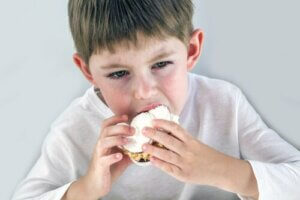Emotional Hunger in Children: What You Should Know

Nowadays, we know that there are two types of hunger: physical hunger and emotional hunger. The first one refers to the hunger we all know. It’s the one we feel in our stomach after spending some time without eating. So, what’s emotional hunger? How can you identify it in children? In this article, you’ll find out.
Before we start on this subject, you should know that food and emotions are closely related. Because, the way we feel in a certain moment reflects on the choices we make when it’s time to eat. And, it also reflects on the amount and the way we eat the food we’ve chosen.
Now, bearing this in mind, instead of saying “Tell me what you eat and I’ll tell you who you are”, we could say: “Tell me what you eat and I’ll tell you what happens.”

Emotional hunger in children
Emotional hunger isn’t in the stomach, it’s “above the neck.” When children are this kind of hungry, it’s because they’re using food as a defense mechanism against negative emotions they don’t know how to handle.
Therefore, children hide their emotions with food. Thus, they start eating food they find comforting, usually the ones which contain high amounts of sugar and fats. However, these binges are useless, since emotional hunger is impossible to satisfy.
According to Ana María Palomino Pérez, nutritionist, some of the negative emotions that lead to emotional eating are rage, apathy, frustration, stress, fear, sadness, anxiety, restlessness, loneliness and boredom.
However, in physiological terms this shouldn’t occur. Because, negative emotions are perceived as threats, which raise blood glucose. And this action decreases or eliminates hunger.
In consequence, we could say that the drive to eat whenever we feel low, isn’t something innate. It’s a socially acquired inadequate behavior.
Signs to identify this type of eating in children
The following are some of the signs that will help you identify when children are emotionally hungry, rather than physically hungry:
- The sensation of hunger is sudden and urgent and it appears at any moment.
- There’s a desire to eat something specific. It’s not all the same.
- They tend to eat more than they normally would.
- Binge eating.
- Eating leads to guilt and shame. Furthermore, hunger is hard to satisfy.
- There’s rapid weight gain. It may even lead to obesity.

“We are not responsible for our emotions. But, we are responsible for what we do with them.”
– Jorge Bucay –
How can you avoid emotional hunger in children?
One important thing to bear in mind in order to avoid emotional hunger is that you shouldn’t reward or punish your children with food. If you do it, they’ll relate specific food to certain emotions, which may lead to an unhealthy relationship with food.
In addition, it’s important to make sure your children have healthy eating habits. But, you shouldn’t be too strict because it could be counterproductive. They should follow a balanced diet, monitoring food intake, but they must be able to eat all kinds of food. If you deprive them of certain food, they may feel the need to compensate for that in the future.
Finally and most importantly, in order to avoid emotional hunger in children, their family should teach them emotional education. This is a very important thing to do during their early childhood.
This way, they’ll grow with the necessary cognitive resources to identify and manage their positive and negative emotions. As a result, they won’t have the drive to eat in such an unbalanced way.
Nowadays, we know that there are two types of hunger: physical hunger and emotional hunger. The first one refers to the hunger we all know. It’s the one we feel in our stomach after spending some time without eating. So, what’s emotional hunger? How can you identify it in children? In this article, you’ll find out.
Before we start on this subject, you should know that food and emotions are closely related. Because, the way we feel in a certain moment reflects on the choices we make when it’s time to eat. And, it also reflects on the amount and the way we eat the food we’ve chosen.
Now, bearing this in mind, instead of saying “Tell me what you eat and I’ll tell you who you are”, we could say: “Tell me what you eat and I’ll tell you what happens.”

Emotional hunger in children
Emotional hunger isn’t in the stomach, it’s “above the neck.” When children are this kind of hungry, it’s because they’re using food as a defense mechanism against negative emotions they don’t know how to handle.
Therefore, children hide their emotions with food. Thus, they start eating food they find comforting, usually the ones which contain high amounts of sugar and fats. However, these binges are useless, since emotional hunger is impossible to satisfy.
According to Ana María Palomino Pérez, nutritionist, some of the negative emotions that lead to emotional eating are rage, apathy, frustration, stress, fear, sadness, anxiety, restlessness, loneliness and boredom.
However, in physiological terms this shouldn’t occur. Because, negative emotions are perceived as threats, which raise blood glucose. And this action decreases or eliminates hunger.
In consequence, we could say that the drive to eat whenever we feel low, isn’t something innate. It’s a socially acquired inadequate behavior.
Signs to identify this type of eating in children
The following are some of the signs that will help you identify when children are emotionally hungry, rather than physically hungry:
- The sensation of hunger is sudden and urgent and it appears at any moment.
- There’s a desire to eat something specific. It’s not all the same.
- They tend to eat more than they normally would.
- Binge eating.
- Eating leads to guilt and shame. Furthermore, hunger is hard to satisfy.
- There’s rapid weight gain. It may even lead to obesity.

“We are not responsible for our emotions. But, we are responsible for what we do with them.”
– Jorge Bucay –
How can you avoid emotional hunger in children?
One important thing to bear in mind in order to avoid emotional hunger is that you shouldn’t reward or punish your children with food. If you do it, they’ll relate specific food to certain emotions, which may lead to an unhealthy relationship with food.
In addition, it’s important to make sure your children have healthy eating habits. But, you shouldn’t be too strict because it could be counterproductive. They should follow a balanced diet, monitoring food intake, but they must be able to eat all kinds of food. If you deprive them of certain food, they may feel the need to compensate for that in the future.
Finally and most importantly, in order to avoid emotional hunger in children, their family should teach them emotional education. This is a very important thing to do during their early childhood.
This way, they’ll grow with the necessary cognitive resources to identify and manage their positive and negative emotions. As a result, they won’t have the drive to eat in such an unbalanced way.
All cited sources were thoroughly reviewed by our team to ensure their quality, reliability, currency, and validity. The bibliography of this article was considered reliable and of academic or scientific accuracy.
- Fernández Lucas, L. M. (2018). Influencia de las emociones en la conducta alimentaria (Trabajo de Fin de Grado). Universidad Autónoma de Madrid, Madrid.
- Palomino-Pérez, A. M. (2020). Rol de la emoción en la conducta alimentaria. Revista chilena de nutrición, 47(2), 286-291.
This text is provided for informational purposes only and does not replace consultation with a professional. If in doubt, consult your specialist.








